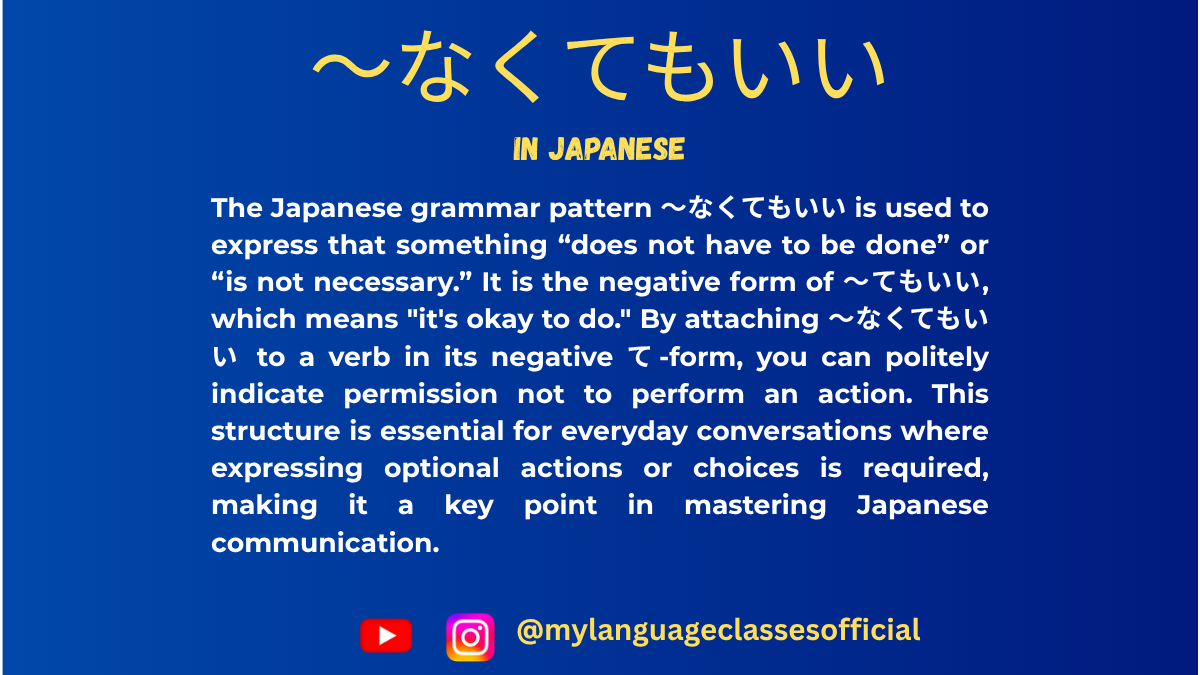Your cart is currently empty!
Understanding 〜なくてもいい

Japanese Expression of “Don’t Have To”: 〜なくてもいい
Japanese is a language rich with expressions that convey subtle nuances of obligation and permission. One such expression is 〜なくてもいい, used to indicate that “you don’t have to” do something. Understanding and using this structure effectively can significantly improve your fluency.
Breaking Down 〜なくてもいい
- Negative Stem of the Verb (〜ない Form): Take the negative form of the verb.
- Example: 行く (to go) → 行かない (not go)
- Drop the 〜い from the Negative Form: 行かない → 行か
- Add 〜なくてもいい: 行か + なくてもいい → 行かなくてもいい (don’t have to go)
This structure expresses that a certain action is not necessary or required.
Usage of 〜なくてもいい
1. General Permission
- When you want to let someone know they are not obligated to do something.
- Example:
- ここで靴を脱がなくてもいいです。
- Koko de kutsu o nuganakute mo ii desu.
- “You don’t have to take off your shoes here.”
2. Polite Conversations
- Often used in formal or polite scenarios to assure someone they can skip an action if they prefer.
- Example:
- 明日までにレポートを完成させなくてもいいですよ。
- Ashita made ni repōto o kansei sasenakute mo ii desu yo.
- “You don’t have to finish the report by tomorrow.”
3. Casual Speech
- In informal contexts, the です at the end is dropped.
- Example:
- 時間があるから急がなくてもいいよ。
- Jikan ga aru kara isoganakute mo ii yo.
- “We have time, so you don’t have to rush.”
4. Responding to Offers
- Used to decline politely without implying refusal.
- Example:
- A: コートを着ますか? (Kōto o kimasu ka? – “Will you wear a coat?”)
- B: いいえ、寒くないから着なくてもいいです。 (Iie, samukunai kara kinakutemo ii desu. – “No, it’s not cold, so I don’t have to.”)
5. Expressing Flexibility
- Indicates that while something isn’t required, it’s an option if desired.
- Example:
- これを全部食べなくてもいいですが、味見はしてください。
- Kore o zenbu tabenakute mo ii desu ga, ajimi wa shite kudasai.
- “You don’t have to eat it all, but please at least taste it.”
Situations Where 〜なくてもいい is Commonly Used
- Work and Deadlines
- To reassure someone about deadlines or tasks.
- Example: 明日は休みなので仕事をしなくてもいいです。(Ashita wa yasumi na no de shigoto o shinakute mo ii desu. – “Tomorrow is a holiday, so you don’t have to work.”)
- Polite Customer Interactions
- To make customers feel at ease.
- Example: サインをしなくてもいいです。 (Sain o shinakute mo ii desu. – “You don’t have to sign it.”)
- House Rules
- Explaining flexibility in household practices.
- Example: ゴミを分けなくてもいいですが、できればお願いします。(Gomi o wakenakute mo ii desu ga, dekireba onegaishimasu. – “You don’t have to separate the trash, but it would be appreciated.”)
- Travel and Leisure
- Suggesting freedom in plans.
- Example: 観光地を全部行かなくてもいいです。(Kankōchi o zenbu ikanakute mo ii desu. – “You don’t have to visit all the tourist spots.”)
- Education and Learning
- Allowing flexibility in studies or rules.
- Example: 全部覚えなくてもいいですが、重要な部分を覚えてください。(Zenbu oboenakute mo ii desu ga, jūyō na bubun o oboete kudasai. – “You don’t have to remember everything, but please remember the important parts.”)
- Health and Fitness
- Reassuring someone about physical activities or diets.
- Example: 毎日運動しなくてもいいですが、少しずつ始めましょう。(Mainichi undō shinakute mo ii desu ga, sukoshizutsu hajimemashō. – “You don’t have to exercise every day, but let’s start gradually.”)
Key Points to Remember
- Politeness Level Matters: Use です or だ depending on the context.
- Soft Assurance: It’s not a refusal but a comforting statement.
- Double Negatives: Avoid pairing it with affirmative statements to prevent confusion.
Mastering 〜なくてもいい will not only make your Japanese more natural but also help you convey reassurance and politeness in various scenarios. It’s a versatile expression that reflects the considerate nature of the language.
If you enjoyed this lesson, be sure to check out more posts like this on my blog at My Language Classes. Don’t forget to subscribe my YouTube channel and follow me on Instagram for the latest language learning tips and lessons. Leave a comment below to share your thoughts, or ask any questions you have about nouns.
Happy learning! 😊
📚 Continue Learning Japanese
Vikas Kumar is a dedicated language educator, content creator, and digital entrepreneur, best known as the co-founder of My Language Classes and The Curious Mind. With a strong focus on helping learners achieve fluency in English, Spanish, and Japanese, he has guided audiences worldwide through a diverse range of resources, including in-depth blog articles, engaging YouTube tutorials, and comprehensive Books.
Through My Language Classes, Vikas has built a thriving multilingual learning platform that serves students, travelers, and professionals eager to master communication skills for personal, academic, and professional success. His expertise extends to exam preparation for internationally recognized certifications such as JLPT, DELE, IELTS, and TOEFL, enabling learners to achieve tangible, career-enhancing results.
As the founder of The Curious Mind, he also explores broader areas of knowledge, including self-help, motivation, modern learning strategies, and thought-provoking insights on life and personal growth. His work blends practical teaching methods with a deep understanding of learner psychology, making complex concepts accessible and engaging.
Driven by a mission to make high-quality education accessible to all, Vikas continues to expand his reach across multiple platforms, including YouTube, blogs, eBooks, and social media communities, inspiring thousands to learn, grow, and embrace lifelong learning.

Leave a Reply